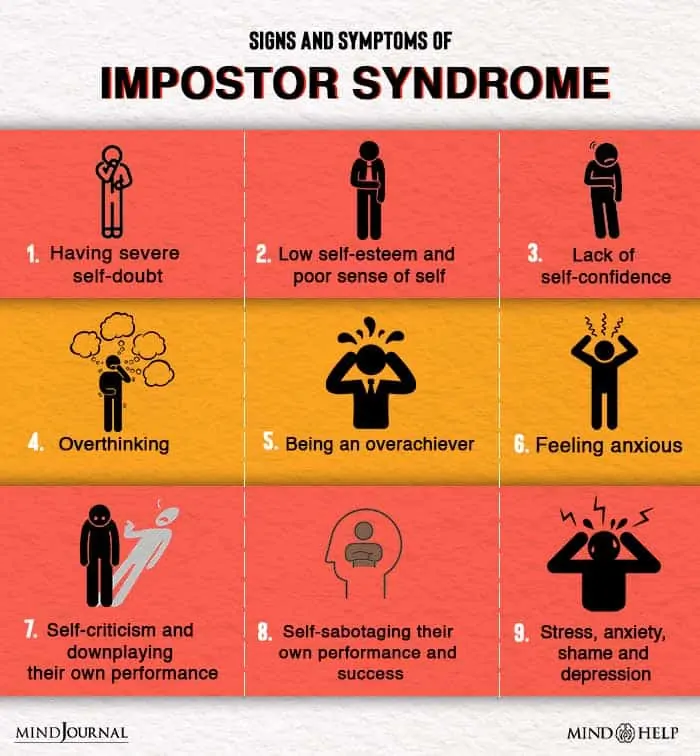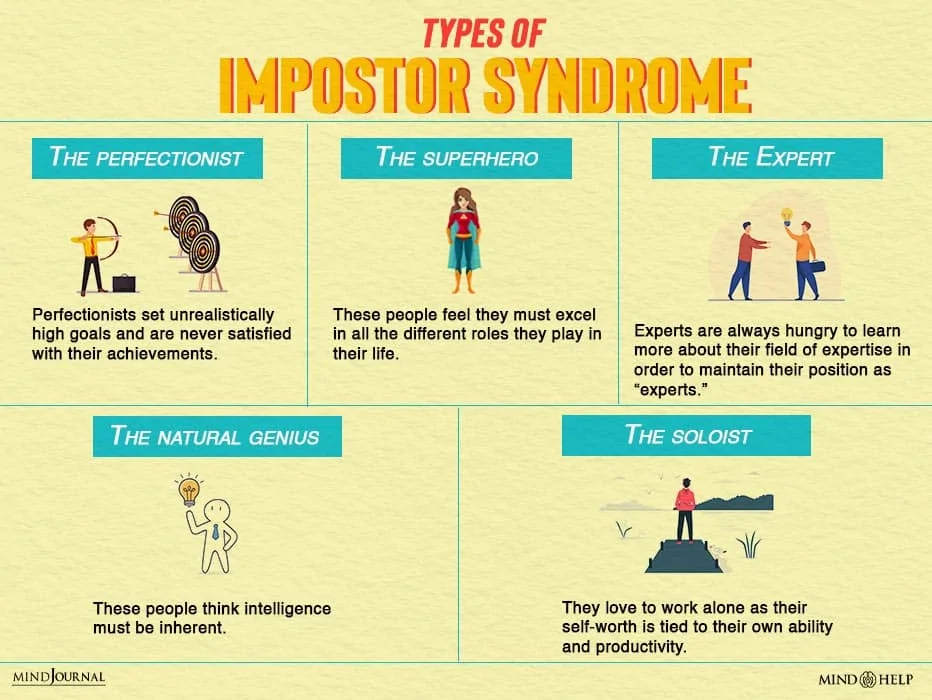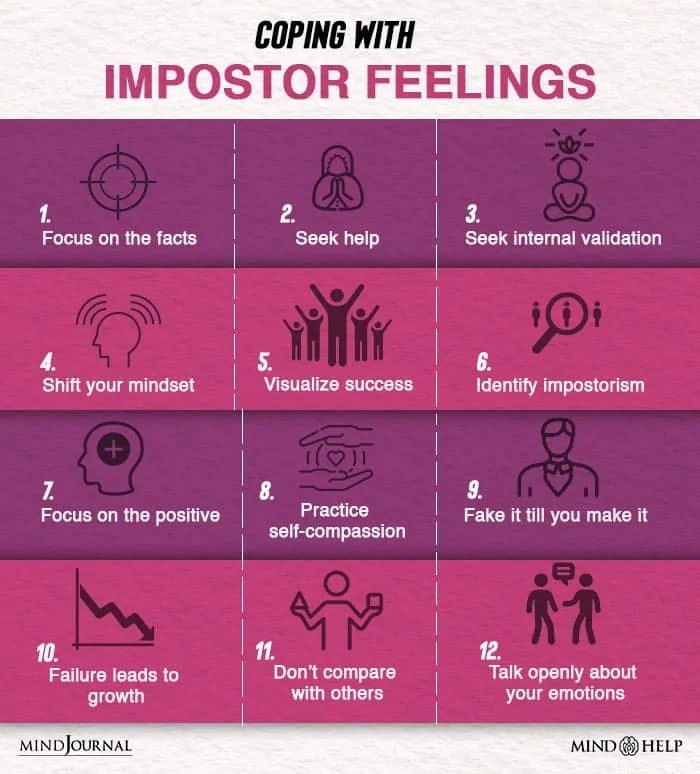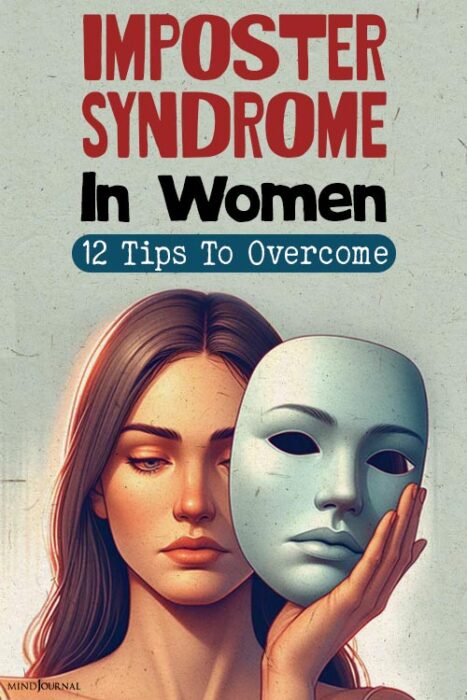Ever felt that despite your achievements, you are nothing but a failure? Do you believe you are not good enough? Do you constantly doubt yourself and fear being exposed as a fraud? Imposter syndrome in women can be a devastating psychological experience that can keep you from being happy and successful in life.
Today, let us delve into the topic of women and imposter syndrome and explore what imposter syndrome is, causes of imposter syndrome, how imposter syndrome affects women and what you can do to overcome it.
What Is Imposter Syndrome?
Impostor syndrome can be defined as an internalized belief of inadequacy or fear of being seen as a fraud, even if there is evidence of competence and accomplishments that contradicts these feelings.

Researchers define this syndrome as “a behavioral health phenomenon described as self-doubt of intellect, skills, or accomplishments among high-achieving individuals.” Also known as imposter phenomenon, fraud syndrome, impostorism, and perceived fraudulence, it was originally described by psychologists Suzanne Imes, Ph.D., and Pauline Rose Clance, Ph.D. while observing successful women in 1978.
As such individuals are unable to acknowledge and internalize their accomplishments and success, they tend to doubt themselves. Hence, they experience anxiety, depression, and/or fear of being exposed as a fraud, even though verifiable evidence points otherwise.
Related: What is Imposter Syndrome?
“People with impostor syndrome struggle with accurately attributing their performance to their actual competence,” as they attribute their achievements on external factors such as luck or support from peers, explains a 2020 study.
However, impostor syndrome is not medically recognized as a psychiatric disorder.
The Connection Between Women and Imposter Syndrome
“The impostor phenomenon is often linked to women and members of ethnic minority groups,” claims a study. Further research points out that while men can also experience this phenomenon, “There have been numerous studies consistently demonstrating the prevalence of IS (Imposter Syndrome) among women.” But why?
Well, many women experience impostor syndrome due to social pressure, gender biases or unreasonable expectations they put on themselves. The constant need for validation from male peers in male-dominated fields, coupled with fear of competing with men’s standards of success can lead to the prevalence of imposter syndrome in women.
Moreover, due to social expectations women often consider their accomplishments as not good enough and have a tendency to downplay their success. Due to the strong association between women and imposter syndrome, most women believe that they need to work harder to gain recognition and respect in this male-dominated society.
5 Subtle Signs of Imposter Syndrome in Women

Wondering what imposter syndrome in women looks like? Here are some common signs of women and imposter syndrome –
1. Self-Doubt
Women with imposter syndrome question their abilities frequently. They constantly doubt the authenticity of their achievements; sometimes attributing their accomplishments to luck or outside factors, instead of accepting that they are skilled and hardworking individuals.
2. Perfectionism
Striving for perfection characterizes most women with imposter syndrome. They tend to set extremely high expectations for themselves, leading to being overwhelmed along with fears about making mistakes or falling short.
3. Overachievement
As they are trapped in thoughts of self-doubt, they constantly feel like failures even when others are inspired by them.
They persistently work harder than others and take on additional responsibilities to make up for their perceived flaws and incompetence to gain validation from others.
4. Fear of Failure
Women with imposter syndrome often suffer from a deep-seated fear of failure that keeps them away from new opportunities and experiences.
It prevents them from taking risks because they are afraid others will find out their perceived incompetence. This is one of the most common signs of imposter syndrome in women.
5. Discounting Achievements
Self-deprecating behaviors are typical for women who have imposter syndrome. It makes them minimize their accomplishments by attributing them to external factors such as luck and other people’s support. This self-deprecating behavior further reinforces feelings of inadequacy.
Related: 7 Imposter Syndrome Myths You Should Know About
Causes of Imposter Syndrome in Women That Are Easy To Miss
Imposter phenomenon or imposter syndrome can be caused by a number of different contributing factors. Here are some probable causes of imposter syndrome –
1. Gender Stereotypes
Imposing societal expectations and gender stereotypes can push women into bouts of impostor syndrome.
The cultural values that portray women as meek, nurturing and barely assertive may result in self-doubt and fear that they could be perceived as too ambitious or confident.
2. Perceived Expectations
Women face unrealistic expectations in many areas of life such as career, relationships, and motherhood. Trying to meet these expectations creates a constant sense of pressure and doubt within oneself. This is one of the major causes of imposter syndrome.
3. Comparison And Social Media
The emergence of social media has increased the tendency for individuals to compare themselves with others leading to feelings of not being good enough.
Moreover, when women see carefully curated highlight reels of others’ seemingly ‘perfect’ lives, it can reinforce imposter syndrome by making it appear as if everyone is happy and successful, except them,
Related: Why Successful, Confident People Still Feel Inferior Or Incapable
How Imposter Syndrome Affects Women

Here are some of the most common effects of imposter syndrome in women that you should be aware of –
1. Undermined Confidence
A woman’s constant self-doubt might eventually eat away her confidence, making it difficult for her to take risks or pursue any new opportunities.
2. Mental Health Challenges
The everlasting fear of being unmasked as a fraud can lead to stress, anxiety, depression and high pressure among women with imposter syndrome. When talking about how imposter syndrome affects women, the negative mental health effects are perhaps the most debilitating.
3. Career Limitations
Imposter syndrome in women can stand in the way of women’s professional growth by preventing them from seeking promotions, negotiating for higher salaries or looking for jobs in leadership or senior management positions.
4. Burnout
The fear of failure and the desperation to succeed can drive women with imposter syndrome to suffer from mental and physical exhaustion, known as burnout.
They may overwork themselves constantly to prove how capable, valuable and worthy they are, while neglecting their physical and mental health. This is how imposter syndrome affects women.
12 Hacks on How to Deal with Imposter Syndrome
Imposter syndrome in women can be a seriously devastating experience as it can affect their mental and physical health along with their personal and professional lives. This is why it is crucial that we learn how to deal with imposter syndrome in a healthy and smart way. Here are some helpful tips to get started –
1. Acknowledge and Normalize
Understand that imposter syndrome is a common occurrence and many successful women have gone through it. Knowing that feeling unsure about yourself does not mean that you are incapable.
2. Challenge Negative Self-Talk
Replace self-critical thoughts with positive affirmations such as “I am good enough” . Remind yourself of your achievements instead of focusing on your weaknesses.
3. Seek Support
Find someone you trust who will listen without judging or criticizing. Look out for friends , mentors or therapists who have wisdom about the situation at hand.
4. Embrace Failure
Consider failure as an opportunity for learning, which is instrumental in growth. One must realize that mistakes and failure are part of the learning and growing process.
5. Celebrate Achievements
It doesn’t matter how trivial your accomplishments may appear, make sure to celebrate each milestone and success.
Keep track of your achievements to remind yourself of your true potential, especially during those moments when you doubt yourself. This is one of the most effective ways to deal with imposter syndrome in women.
Related: How To Overcome Imposter Syndrome? 9 Ways To Stop Doubting Yourself And Start Thriving
6. Develop a Growth Mindset
Believe that skills and abilities can be developed through effort and hard work. Instead of seeing challenges as threats to your abilities, see them as opportunities for growth and development.
7. Set Realistic Goals
Set reasonable goals for yourself which reflect your values and dreams. Split bigger goals into smaller tasks that are easier to manage and achieve. This will help to boost your confidence and to track your growth.
8. Practice Self-Compassion
How do you treat a friend when they fail or make mistakes? Do you criticize them constantly or do you in an empathetic and compassionate manner? Then treat yourself with the same love and kindness. Give yourself the support you need and treat yourself with empathy and compassion.
9. Challenge Perfectionism
Keep in mind that perfection is an impossible standard. Focus on improving and making progress rather than trying to be flawless. Give yourself permission to make mistakes and learn from them.
10. Embrace Feedback
Do not be afraid of negative criticism, instead seek feedback from people you trust and look up to. Feedback can provide valuable insights for one’s personal growth and development.
11. Mentorship and Role Models
Find mentors or role models who have faced similar situations as you are facing now. Their experiences can help and guide you and provide inspiration for moving forward in your journey.
12. Take Care of Your Well-being
Participate in activities that promote physical, mental, emotional well-being and overall good health. Engage in activities that bring you happiness, reduce stress levels and help you renew your energy levels.
Related: How To Defeat Imposter Syndrome and Bring Success Into Your Life

Takeaway
Imposter syndrome in women is a common yet debilitating experience faced by many women. The fear of inadequacy and ongoing self-doubt can hinder both personal development and professional advancement.
Nevertheless, being aware of the symptoms, understanding its root causes and applying empowering strategies can help women overcome imposter syndrome. Acknowledge your strengths and abilities, recognize achievements you have already made and develop a mindset for growth.
With persistence and self-love, you can rise above imposter syndrome and reach your true potential. Release all self-doubt, embrace your brilliance, and build a life for yourself where you thrive with confidence and authenticity.
Frequently Asked Questions (FAQs):
Is imposter syndrome common in women?
Imposter syndrome is widely observed in women, marked by self-doubt despite their achievements and competence.
What is the root cause of imposter syndrome?
The primary cause of imposter syndrome is mainly internalized fear of failure, lack of confidence and low self-esteem.
What are the 5 types of imposter syndrome?
The 5 types of imposter syndrome are Perfectionist, Superwoman/man, Natural Genius, Soloist, and Expert.









Leave a Reply
You must be logged in to post a comment.